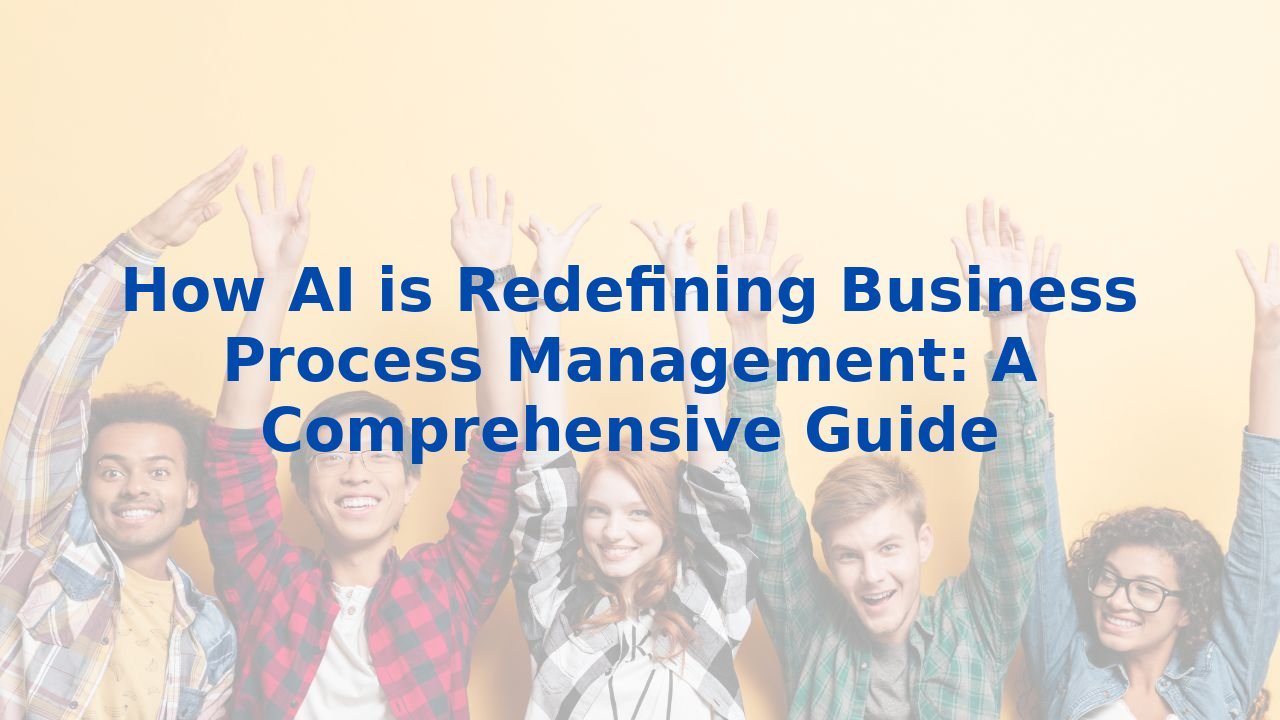How AI is Redefining Business Process Management: A Comprehensive Guide
How AI Enhances Business Process Management: A Comprehensive Guide
Introduction
In today’s ever-evolving business landscape, the need for agility and efficiency has never been more paramount. Gone are the days when organizations could afford to operate without constant optimization of their processes. With the advent of Artificial Intelligence (AI), Business Process Management (BPM) is undergoing a seismic shift. This guide will explore how AI enhances traditional business processes, emphasizing the efficiency gains achievable through its integration.
What is AI in Business Process Management?
AI in BPM represents the fusion of advanced computational capabilities with systemic operations. It is not merely a tool; it’s a transformative approach that enables organizations to analyze, build, automate, and optimize workflows seamlessly. Imagine a world where time-consuming manual tasks are automated, and data insights drive strategic decision-making—this is the promise of AI-enhanced BPM.
The Role of AI in BPM
Understanding the role AI plays within BPM can illuminate its vast potential. Let’s break it down into three pivotal areas: data analysis, process building, and automation.
- Data Analysis: AI can process vast datasets, uncovering trends and patterns that might remain hidden to human analysts. This capability empowers leaders with insights that can guide both tactical and strategic decisions.
- Process Building: Building workflows from scratch can be arduous and time-consuming. AI can generate new processes based on specific parameters set by users, allowing teams to direct their energies toward more strategic endeavors.
- Automation: Manual tasks such as document processing, content creation, and lead scoring can be tedious and prone to human error. With AI, these processes can be automated, leading to significant time savings and increased accuracy.
Benefits of AI in BPM
The benefits of integrating AI into BPM extend well beyond mere automation. Here are several key advantages:
- Faster Decision-Making: AI provides leaders with a wealth of information, facilitating quicker, more informed decisions.
- Process Optimization: AI can reveal inefficiencies and bottlenecks within existing workflows, allowing organizations to make data-driven adjustments in real-time.
- Real-Time Monitoring: With AI, businesses can continuously monitor their processes, enabling proactive interventions that enhance efficiency and quality.
- Risk Identification: AI identifies anomalies and deviations in data swiftly, mitigating potential risks before they escalate into significant issues.
AI Applications in Business Processes
The reach of AI spans core, support, and longtail business processes, illustrating its versatility. Consider these applications:
- Core Processes: Functions like marketing, production, and customer support can leverage AI-driven innovations to enhance efficiency and output quality.
- Support Processes: Tasks such as IT service management and procurement can achieve smoother operations through automated workflows.
- Longtail Processes: Processes involving repetitive tasks—like document management—can be streamlined, allowing your workforce to focus on higher-value activities.
The Importance of Training Employees for AI
While AI technologies are transformative, their effectiveness hinges on employee proficiency. Here’s why training is critical:
- Understanding AI Capabilities: For AI to truly integrate into workflows, employees must grasp how these systems operate and their potential impacts.
- Adapting to New Technologies: As AI evolves, employees must remain agile, capable of learning and adapting to new tools that enhance productivity.
- Enhancing Collaboration: Training fosters a collaborative work environment where human employees and AI systems complement each other, ensuring optimal outcomes.
Organizations can harness the full potential of AI by investing in comprehensive training programs, such as those found at Complete AI Training, which offer tailored solutions to empower your team. From foundational concepts to advanced applications, training ensures that every employee is equipped to drive the business forward.
Conclusion
AI’s integration into Business Process Management is not just a trend; it’s a necessary evolution for organizations eager to thrive in a competitive landscape. As businesses embrace AI, the improvements in efficiency and decision-making will be profound. However, the journey doesn’t end with technology. To maximize the benefits, organizations must commit to training their employees, fostering a collaborative environment where AI and human intelligence can thrive side-by-side.
In this dynamic age, those who embrace AI-driven BPM alongside a culture of continuous learning will not only survive but excel. The future is bright—let’s illuminate it together.



